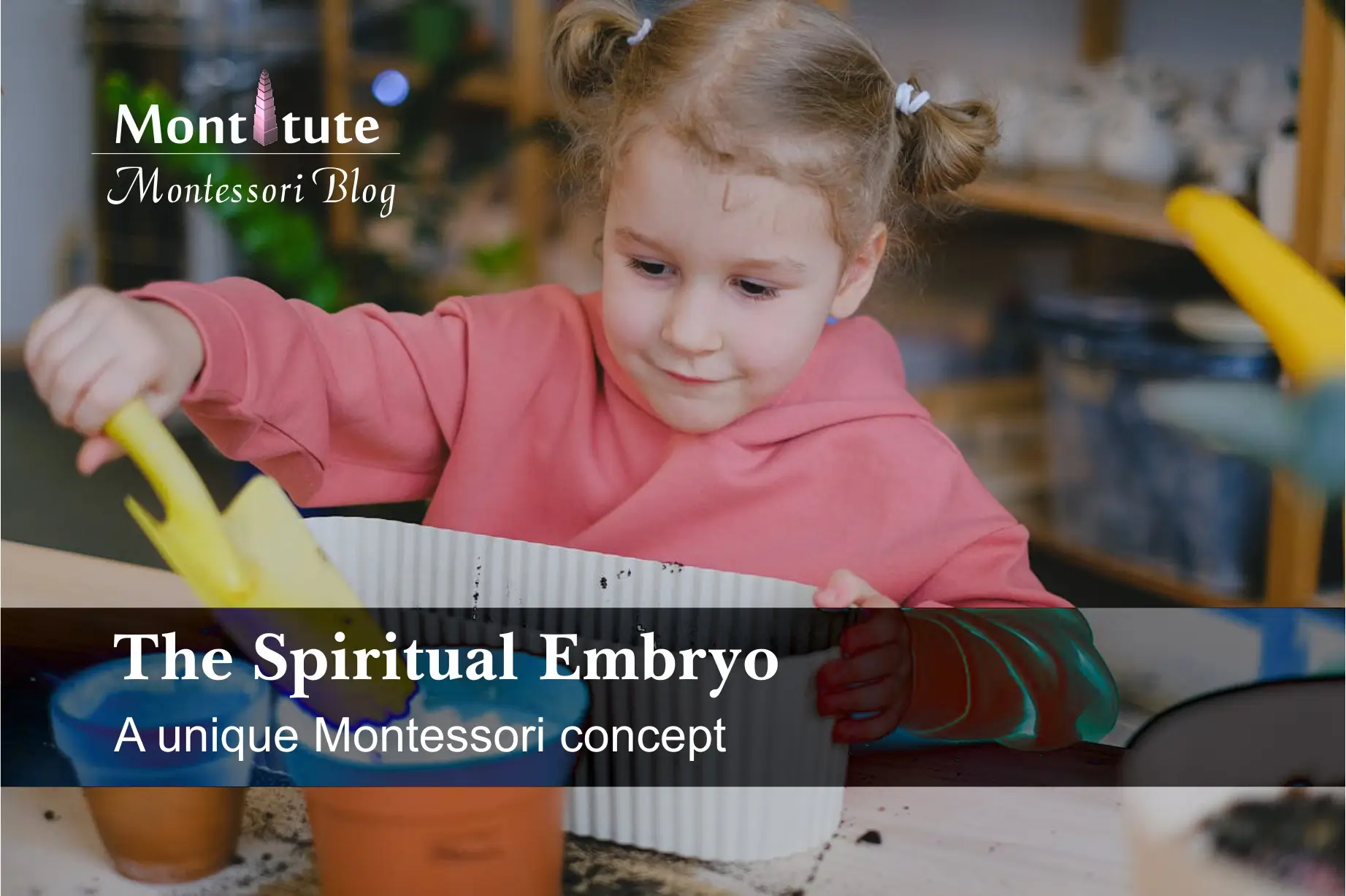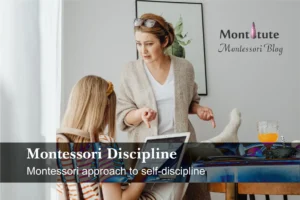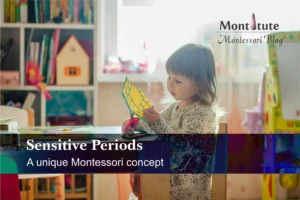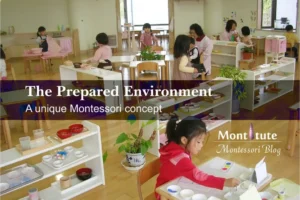
The Spiritual Embryo
- Posted by Montitute
- Categories Blog, Montessori Education
- Date June 1, 2025
- Comments 0 comment
In Montessori education, we often speak of children not only as learners but as beings in the process of self-construction. One of the most profound and beautiful concepts introduced by Dr. Maria Montessori is that of the “Spiritual Embryo.” While the term may sound abstract, it holds deep meaning and practical value for anyone guiding a child through their early years of development.
What is the Spiritual Embryo?
Just as a physical embryo grows in the womb, forming the organs, limbs, and systems of the body, the spiritual embryo represents the child’s inner development — the growth of the personality, intellect, will, emotions, and moral sense.
According to Dr. Montessori, the spiritual embryo begins at birth and continues roughly until the age of six years. This is a time when the child is forming their sense of self, their ability to interact with others, and their understanding of the world.
Think of it this way: the physical embryo needs the right environment (the womb, nourishment, and time) to grow. Similarly, the spiritual embryo needs a nurturing environment, meaningful experiences, and freedom in order to develop into a healthy, balanced human being.
The Birth of the Spiritual Embryo
While the physical birth brings the child into the world, the birth of the spiritual embryo marks the beginning of the child’s inner journey. From the moment a child opens their eyes to the world, they are absorbing everything—language, movements, relationships, routines, culture. It’s a silent, invisible work, but it’s incredibly powerful.
Dr. Montessori wrote:
“Man is not born with faculties, but with the capacity to develop them.”
This capacity — to build oneself from the inside out — is what she called the “creative energy” of the spiritual embryo.
Key Characteristics of the Spiritual Embryo
To recognize and support the spiritual embryo, it helps to understand its unique features:
Absorbent Mind
From birth to around age six, the child’s mind is like a sponge. They absorb everything effortlessly and unconsciously, especially in the first three years. Language, culture, emotional tone — all of it is soaked up and becomes a part of their personality. Read More…
Sensitive Periods
During early childhood, children pass through sensitive periods, or windows of opportunity, when they are especially drawn to particular types of learning. These might include language, order, movement, or social behaviors. The spiritual embryo uses these sensitive periods to build key human abilities.
Self-Construction
Unlike an adult who learns by adding new knowledge, the young child is actually constructing themselves. They are not just learning what to do, but becoming someone, shaping their identity and potential.
Unconscious to Conscious Development
The child’s early spiritual development begins unconsciously. Over time, it becomes more intentional and conscious. Around age 3, you’ll begin to notice children taking pride in their independence, asserting their will, and showing preferences — signs that the spiritual embryo is maturing.
Importance of the Spiritual Embryo
The idea of the spiritual embryo reminds us that early childhood is not just about play or academic readiness — it is about laying the foundation of a whole human being.
This includes:
- Emotional security
- Confidence and independence
- Empathy and social awareness
- A love of learning
- A sense of order and inner discipline
When nurtured properly, the spiritual embryo blossoms into a child who is balanced, curious, kind, and resilient.
How Montessori Supports the Spiritual Embryo
Montessori environments are designed precisely to nourish this inner development. Here’s how:
Prepared Environment
Montessori classrooms are not cluttered or chaotic. They are calm, ordered, and inviting. Everything has a purpose and a place, which satisfies the child’s need for order and predictability. Read more…
Freedom with Responsibility
Children are free to choose their activities, but within limits that teach them responsibility. This balance fosters independence and self-control — key aspects of a healthy spiritual embryo.
Respect for the Child
Montessori educators observe rather than control. They respect the child’s inner timetable and unique path of development, allowing space for the spiritual embryo to unfold naturally.
Real-Life Activities
Practical Life work (pouring, cleaning, cooking, dressing) is not busywork. It gives children a sense of purpose, concentration, and dignity. These activities build the will and coordination, helping the child feel capable and connected to their environment.
Supporting the Spiritual Embryo at Home
You don’t need to recreate a Montessori classroom to support your child’s spiritual development. Here are simple ways to help at home:
- Provide Order: Children thrive in predictable, tidy spaces. Have routines, consistent expectations, and a place for everything.
- Model Respect: Speak to your child with kindness. Listen carefully. Allow them to express themselves and make age-appropriate choices.
- Encourage Independence: Let them dress themselves, pour their own water, help with cooking, and tidy up. These small acts grow the child’s sense of self.
- Allow Concentration: If your child is focused, don’t interrupt. Deep concentration is food for the spiritual embryo.
- Limit Screens and Noise: Too much stimulation can overwhelm the child’s developing inner world. Offer calm, natural, and real-life experiences instead.
Understanding the concept of the spiritual embryo invites us to look beyond behavior, milestones, or grades. It calls us to see each child as a whole person in the making — someone who is shaping their own mind, character, and soul through their daily experiences.
As Montessori parents and educators, our role is to observe, respect, and gently guide this inner growth. We do not shape the child like clay. Instead, we provide the fertile soil in which the spiritual embryo can grow—naturally, beautifully, and uniquely.
You may also like

Montessori Discipline

Sensitive Periods in Montessori Education

